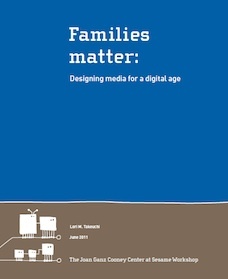This piece originally appeared in the Huffington Post.
 On Tuesday, June 7, the Joan Ganz Cooney Center at Sesame Workshop will present a report at the E 3 Expo in Los Angeles that may surprise media designers and cause policymakers to step back from their current concerns about kids’ digital multitasking addiction, cyber-bullying, violent videogames, and mobile disruptions in school. While much of the public discussion about digital media is concentrated on how little influence parents have in shaping their children’s consumption habits, and how designers are creating a panoply of empty calories that may be poisoning healthy development, our research finds a more nuanced view. While there is certainly cause for concern, especially for the quality of content now produced for children in their primary years, our research finds plenty of room for new hope and confidence. Most parents actually have the media explosion under control!
On Tuesday, June 7, the Joan Ganz Cooney Center at Sesame Workshop will present a report at the E 3 Expo in Los Angeles that may surprise media designers and cause policymakers to step back from their current concerns about kids’ digital multitasking addiction, cyber-bullying, violent videogames, and mobile disruptions in school. While much of the public discussion about digital media is concentrated on how little influence parents have in shaping their children’s consumption habits, and how designers are creating a panoply of empty calories that may be poisoning healthy development, our research finds a more nuanced view. While there is certainly cause for concern, especially for the quality of content now produced for children in their primary years, our research finds plenty of room for new hope and confidence. Most parents actually have the media explosion under control!
Written by our Director of Research Lori Takeuchi, Families Matter: Designing Media for a Digital Age finds, unsurprisingly, that digital media have become a major force in the rhythm of modern family life. It documents how most families are in a “transition period,” one in which parents recognize the importance of technology in their children’s learning and future success, but don’t always grant their kids access to the newer forms of media transforming their own adult lives.
The report profiles how parents’ personal experiences with media are one of the key factors shaping the approaches they take in guiding their children’s media consumption. A national survey of 800 parents of young children (ages 3-10) found that nearly two-thirds limit media consumption on a case-by-case basis. Of parents surveyed, 57% recognize that digital media presents ways for children to converse and connect with friends and family, but two-thirds of parents restrict their children from chatting online and visiting social networking sites.
 The study also revealed that only half of parents are playing with their kids on newer platforms such as video game consoles: They report spending more time with their children engaged in traditional activities, including watching television, reading books and playing board games. More than half of parents are concerned about the effect of media usage on their children’s health, but fewer than 1 in 5 parents think their kids spend too much time with digital media. Other findings include:
The study also revealed that only half of parents are playing with their kids on newer platforms such as video game consoles: They report spending more time with their children engaged in traditional activities, including watching television, reading books and playing board games. More than half of parents are concerned about the effect of media usage on their children’s health, but fewer than 1 in 5 parents think their kids spend too much time with digital media. Other findings include:
- – More than a third of parents have learned something technical from their child.
- – Lack of exercise and online privacy are parents’ greatest concerns.
- – Most believe that video games help children foster skills that are important to their academic achievement.
- – Rule setting peaks at age 7. Parents with children older than 7 are more likely to set parent controls on their computers.
The report also features in-depth case studies, probing how parent attitudes toward technology, along with family values, routines and structures, are shaping young children’s experiences using digital media.
Families Matter offers recommendations to bolster the development of media content that can support learning and encourage adult-child interactions. Recommendations include:
- – Tailor media platforms for children – Many media platforms are designed for adult use. Media producers should examine how the features of new platforms relate to children’s social, cognitive and physical development.
- – Investigate co-viewing – Children learn more from television programs when they watch with a parent. Co-participation should be explored for video games, e-books, tablet devices and other media that will encourage adults to engage with children to further enhance their learning.
- – Foster teamwork – Digital media are often faulted for children spending less time socializing face-to-face with peers and family. Producers should design content that drives participants to interact and play together.
- – Design for healthy development – Adults are concerned that digital media are superseding activities including outdoor exercise, imaginative play and socializing. Media producers should look to use technology to get children involved in these foundational activities.
- – Industry Educational Standards – Especially during a time of weak U.S. educational performance, industry producers have an opportunity and responsibility to expand educational products for children and families. To date, no established mechanism for rating digital media’s educational value has been established, but recently Common Sense Media announced the formation of a new research-based report card. This approach holds promise in stimulating greater production of educational media by holding producers accountable.
Our study concludes that when it comes to digital media’s influence on children, the more things change, the more they stay the same. Kids obviously need guidance to understand the critical skills that are required in a ubiquitous media environment. It is critical that industry, researchers and policymakers understand that when it comes to promoting learning and positive social habits, families still matter most.



